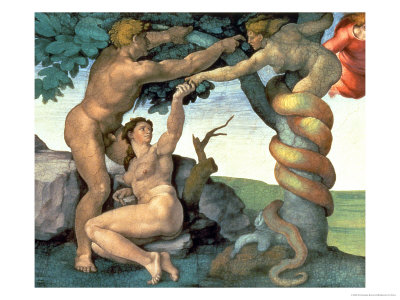 |
Craig White's Literature Courses Original Sin |
 |
OED original sin n. Theology. a state of corruption or sinfulness, or a tendency to evil, supposedly innate in all human beings and held to be inherited from Adam as a consequence of the Fall; opposed to actual sin (the concept of original sin was established by the writings of St Augustine).
Finer points of Original Sin are much debated, but humanity's essential and inherent depravity appears as a precondition for the soul's salvation.
In North American culture, the doctrine of Original Sin was emphasized by the Puritans of New England in the 1600s and beyond (as with Sinners in the Hands of an Angry God). The Puritans received this emphasis through the Protestant Reformed theologian John Calvin (1509-64), who inherited the doctrine not only from scripture (see below) but from teachings of St. Augustine of Hippo (354-430).
In American literature, fiction by Nathaniel Hawthorne (1804-64)—The Scarlet Letter, "The Minister's Black Veil," and "Young Goodman Brown"—develops the concept of Original Sin as a variation on the gothic convention of past sins or hidden crimes and, more humanisitically, as a common ground on which people can recognize their shared, flawed humanity and avoid the greater sin of pride.
The factor of original sin (however secularized or humanized) appears also in the fiction of Hawthorne's contemporary Herman Melville (1819-92), author of Moby-Dick (1851). Both Melville and Hawthorne descended from Calvinistic or Reformed churches, which are a minority in American denominations. Most American theologies, especially those rising since the Second Great Awakening, emphasize the free will of the individual to accept or reject salvation, while the Reformed tradition emphasizes the sovereignty of God in all such matters. The most identifiable denomination today in this tradition is Presbyterianism, but also the United Church of Christ, of which President Obama is a member. (The UCC includes the old Congregationalist or Puritan churches.)
American literature's maintenance of an original-sin tradition sets it somewhat at variance with traditional Romanticism.
![]() Romanticism posits that humans are born
good and innocent, but are corrupted by civilization, adulthood,
compromises, learning that distracts them from their natural impulses.
Romanticism posits that humans are born
good and innocent, but are corrupted by civilization, adulthood,
compromises, learning that distracts them from their natural impulses.
![]() Reformed
Christianity and Original Sin posit that humans are born inherently flawed
and with a tendency to go or do wrong, but that accepting this situation
prepares a person to reform their lives, given God's grace.
Reformed
Christianity and Original Sin posit that humans are born inherently flawed
and with a tendency to go or do wrong, but that accepting this situation
prepares a person to reform their lives, given God's grace.
Hawthorne and Melville are classic authors not just because they conform to Romanticism but because they vary it in unique ways that make a reader think or experience life beyond conventional formulas.
![]()
Scriptural source for Original Sin
Romans 5: 12-21
12 Therefore, as by one man sin entered into the world, and death by sin, so death passed onto all men, for all have sinned. . . . 17 For
if by one man's offense death reigned by one, much more those who
receive abundance of grace and the gift of righteousness shall reign in life by
One, Jesus Christ.
18
Therefore
as by the offense of one, judgment to condemnation came upon all men, even so by
the righteousness of One, the free gift unto justification of life came upon all
men.
19
For
as by one man's disobedience many were made sinners, so by the
obedience of One shall many be made righteous.
20 Moreover
the law entered, that the offense might abound. But where sin abounded, grace
did much more abound,
21
that,
as sin hath reigned unto death, even so might grace reign through righteousness
unto eternal life by Jesus Christ our Lord.

2001
erotic thriller